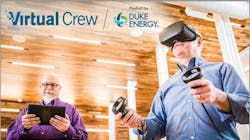Duke Energy Offers Customized VR Training Programs for Energy Company Workers
Duke Energy recently announced it is offering virtual reality (VR) training services branded Virtual Crew to energy companies and contractors nationwide.
With Virtual Crew, Duke Energy can customize simulated field training and qualifications to meet each company’s specific needs, as well as offer existing VR training modules. Industrial Training Services (ITS) will collaborate with Duke Energy to pair interested clients with the service and provide a compliance-tracking solution.
"The benefits of VR training are clear. With our experience in this area, Duke Energy now is uniquely positioned to offer informed, customized VR programs tailored to meet the needs of energy companies both large and small," said Brian Weisker, chief operations officer of natural gas at Duke Energy. "ITS, with its history of providing innovative service dedicated to the energy industry, is the perfect choice to help us expand this training to energy companies nationwide."
VR training completed in Virtual Crew will be documented just like any traditional written exam, performance evaluation, or training record, thanks to integration with ITS' learning management system, OnBoard LMS.
"Virtual Crew is a natural extension of ITS' history of innovation, using technology to simplify and enhance worker training," said Stephanie Balmer, president and COO of ITS. "ITS is thrilled to work with Duke Energy to add VR to our portfolio of industry-leading training and curriculum, and we look forward to future product enhancements that continue to meet the needs of the energy industry."
Existing VR modules include natural gas leak detection surveys, line purging, joining plastic pipe, and electric substation inspection. Programs also can be created for non-utility scenarios, such as active shooter response.
"Since introducing the Virtual Crew program to employees in our natural gas business unit in 2020, Duke Energy has continued to develop engaging, immersive VR training," Weisker said. "Building on that success, we've expanded the program to include training for the company's electric employees."
Duke Energy’s natural gas business unit will realize savings of approximately three hours in training time per technician per course through the use of VR and forecasts annual savings of more than US$500,000 in operational costs, including travel and instructor expenses.
Technicians trained through VR were able to perform tasks three times faster than technicians receiving classroom-based training.
Other benefits of VR training include:
- An immersive and interactive experience: The user can interact with the virtual environment in lifelike simulations.
- The opportunity for sensory reaction: Immersion triggers the user's emotions in addition to multiple senses, giving the sensation of reality.
- Real-time feedback: Users can experience the real-time consequences of their choices in a safe environment.
- Increased focus: VR uniquely focuses the user's attention on the training experience.
To learn more about the development of the VR technology behind Virtual Crew, visit Duke Energy's illumination site. Companies interested in Virtual Crew can email [email protected] for more information.
